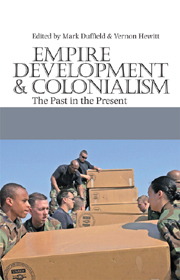Book contents
- Frontmatter
- Contents
- Acknowledgements
- Notes on Contributors
- Introduction
- 1 The Exceptional inclusion of ‘Savages’ & ‘Barbarians’
- 2 Empire, International Development & the Concept of Good Government
- 3 Empire: a Question of Hearts?
- 4 ‘Conflict-Sensitive’ Aid & Making liberal Peace
- 5 Development, Poverty & Famines
- 6 Plain Tales from the Reconstruction Site
- 7 The International Politics of Social Transformation
- 8 Liberal Interventionism & the Fragile State
- 9 Freedom, Fear & NGOs
- 10 Theorising Continuities between Empire & Development
- 11 Spatial Practices & Imaginaries
- 12 Decolonising the Borders in Sudan
- 13 ‘Individualism is, Indeed, Running Riot’
- Index
13 - ‘Individualism is, Indeed, Running Riot’
Components of the Social Democratic Model of Development
Published online by Cambridge University Press: 05 February 2013
- Frontmatter
- Contents
- Acknowledgements
- Notes on Contributors
- Introduction
- 1 The Exceptional inclusion of ‘Savages’ & ‘Barbarians’
- 2 Empire, International Development & the Concept of Good Government
- 3 Empire: a Question of Hearts?
- 4 ‘Conflict-Sensitive’ Aid & Making liberal Peace
- 5 Development, Poverty & Famines
- 6 Plain Tales from the Reconstruction Site
- 7 The International Politics of Social Transformation
- 8 Liberal Interventionism & the Fragile State
- 9 Freedom, Fear & NGOs
- 10 Theorising Continuities between Empire & Development
- 11 Spatial Practices & Imaginaries
- 12 Decolonising the Borders in Sudan
- 13 ‘Individualism is, Indeed, Running Riot’
- Index
Summary
Introduction
The political ascendancy of the neo-liberal agenda in development policy has reopened the debate over the trade-off. Between social cohesion and the extension of market relations. The disintegrating effects of capitalism has led to the reinvention of the ‘social’, to put in place mechanisms for stabilisation and integration. Social democracy has historically made the claim to provide these through collectivist solutions. The aim here is to identify how the British Labour Party translated this aspiration into its policy on Africa during the colonial period. In the origins of the party's ideas on development, we can trace some of the assumptions that underpinned the post-war promotion of the developmental state, aspects of which have continued to cast a long shadow over official thinking.
The British Labour Party first formulated its policy on Africa in the 1920s at a time when ‘hegemony on a shoestring’ (Berry 1993:24) depended on preserving the tribal chiefs, many of them state appointees, as the principal collaborators of colonial rule. The main authors of Labour's foreign policy were Radical Liberals who had defected to Labour around the end of the World War I. E.D.Morel and Charles Buxton were particularly influential on the Advisory Committee on Imperial Questions which was the party's main discussion forum on colonial policy and, until the late 1920s, a significant influence on its National Executive Committee. Their preoccupation with the impact of colonialism on Africa was primarily defensive: to preserve the communal ownership of land in order to halt the advancing tide of proletarianisation.
- Type
- Chapter
- Information
- Empire, Development and ColonialismThe Past in the Present, pp. 188 - 202Publisher: Boydell & BrewerPrint publication year: 2009



